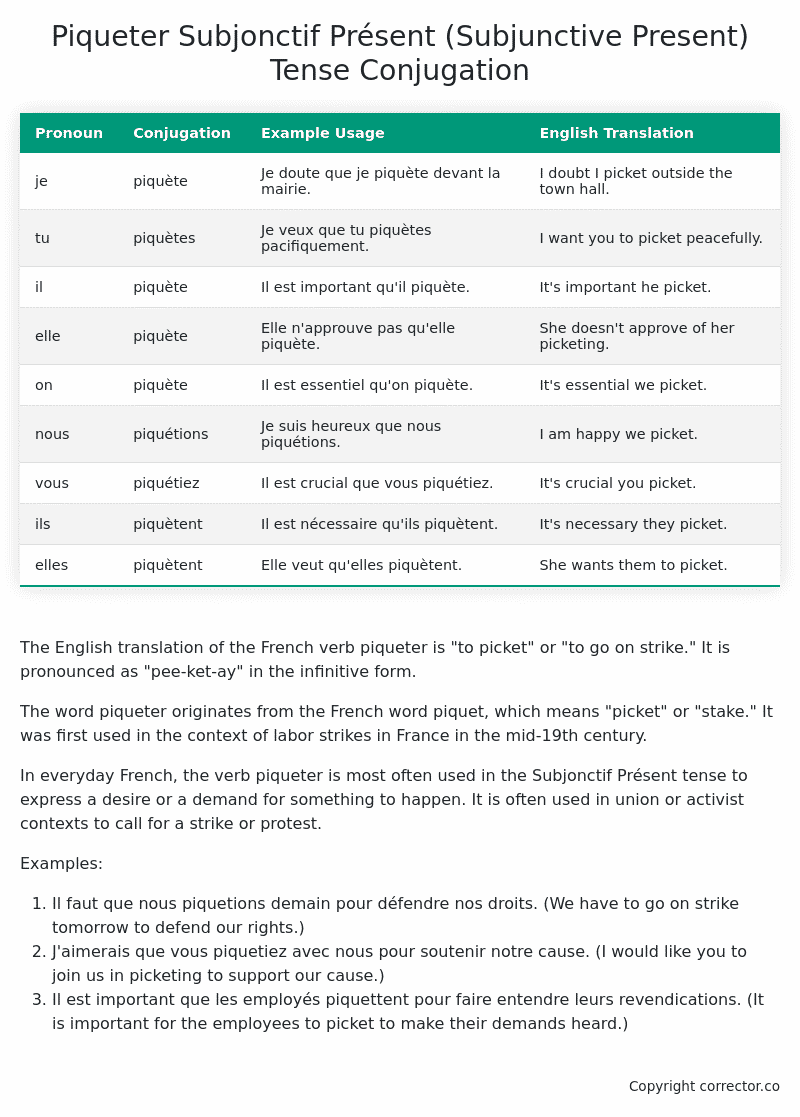Subjonctif Présent (Subjunctive Present) Tense Conjugation of the French Verb piqueter
Introduction to the verb piqueter
The English translation of the French verb piqueter is “to picket” or “to go on strike.” It is pronounced as “pee-ket-ay” in the infinitive form.
The word piqueter originates from the French word piquet, which means “picket” or “stake.” It was first used in the context of labor strikes in France in the mid-19th century.
In everyday French, the verb piqueter is most often used in the Subjonctif Présent tense to express a desire or a demand for something to happen. It is often used in union or activist contexts to call for a strike or protest.
Examples:
- Il faut que nous piquetions demain pour défendre nos droits. (We have to go on strike tomorrow to defend our rights.)
- J’aimerais que vous piquetiez avec nous pour soutenir notre cause. (I would like you to join us in picketing to support our cause.)
- Il est important que les employés piquettent pour faire entendre leurs revendications. (It is important for the employees to picket to make their demands heard.)
Table of the Subjonctif Présent (Subjunctive Present) Tense Conjugation of piqueter
| Pronoun | Conjugation | Example Usage | English Translation |
|---|---|---|---|
| je | piquète | Je doute que je piquète devant la mairie. | I doubt I picket outside the town hall. |
| tu | piquètes | Je veux que tu piquètes pacifiquement. | I want you to picket peacefully. |
| il | piquète | Il est important qu’il piquète. | It’s important he picket. |
| elle | piquète | Elle n’approuve pas qu’elle piquète. | She doesn’t approve of her picketing. |
| on | piquète | Il est essentiel qu’on piquète. | It’s essential we picket. |
| nous | piquétions | Je suis heureux que nous piquétions. | I am happy we picket. |
| vous | piquétiez | Il est crucial que vous piquétiez. | It’s crucial you picket. |
| ils | piquètent | Il est nécessaire qu’ils piquètent. | It’s necessary they picket. |
| elles | piquètent | Elle veut qu’elles piquètent. | She wants them to picket. |
Other Conjugations for Piqueter.
Le Present (Present Tense) Conjugation of the French Verb piqueter
Imparfait (Imperfect) Tense Conjugation of the French Verb piqueter
Passé Simple (Simple Past) Tense Conjugation of the French Verb piqueter
Passé Composé (Present Perfect) Tense Conjugation of the French Verb piqueter
Futur Simple (Simple Future) Tense Conjugation of the French Verb piqueter
Futur Proche (Near Future) Tense Conjugation of the French Verb piqueter
Plus-que-parfait (Pluperfect) Tense Conjugation of the French Verb piqueter
Passé Antérieur (Past Anterior) Tense Conjugation of the French Verb piqueter
Futur Antérieur (Future Anterior) Tense Conjugation of the French Verb piqueter
Subjonctif Présent (Subjunctive Present) Tense Conjugation of the French Verb piqueter (this article)
Subjonctif Passé (Subjunctive Past) Tense Conjugation of the French Verb piqueter
Subjonctif Imparfait (Subjunctive Imperfect) Tense Conjugation of the French Verb piqueter
Subjonctif Plus-que-parfait (Subjunctive Pluperfect) Tense Conjugation of the French Verb piqueter
Conditionnel Présent (Conditional Present) Tense Conjugation of the French Verb piqueter
Conditionnel Passé (Conditional Past) Tense Conjugation of the French Verb piqueter
L’impératif Présent (Imperative Present) Tense Conjugation of the French Verb piqueter
L’infinitif Présent (Infinitive Present) Tense Conjugation of the French Verb piqueter
Struggling with French verbs or the language in general? Why not use our free French Grammar Checker – no registration required!
Get a FREE Download Study Sheet of this Conjugation 🔥
Simply right click the image below, click “save image” and get your free reference for the piqueter Subjonctif Présent tense conjugation!

Piqueter – About the French Subjonctif Présent (Subjunctive Present) Tense
Formation of the Subjonctif Présent
Common Everyday Usage Patterns
Interactions with Other Tenses
Summary
I hope you enjoyed this article on the verb piqueter. Still in a learning mood? Check out another TOTALLY random French verb conjugation!


